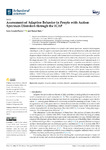Assessment of Adaptive Behavior in People with Autism Spectrum Disorders through the ICAP

View/
Use this link to cite
http://hdl.handle.net/2183/32250Collections
- Investigación (FEDU) [938]
Metadata
Show full item recordTitle
Assessment of Adaptive Behavior in People with Autism Spectrum Disorders through the ICAPDate
2022-09-15Citation
Losada-Puente, L.; Baña, M. Assessment of Adaptive Behavior in People with Autism Spectrum Disorders through the ICAP. Behav. Sci. 2022, 12, 333. https://doi.org/ 10.3390/bs12090333
Abstract
[Abstract] Evaluating adaptive behavior in people with Autism Spectrum Disorder (ASD) requires attending to a set of cognitive processes associated with social interaction skills and functional communication that are altered. This paper presents the analysis of an instrument to assess and diagnose adaptive behavior in people with Autism Spectrum Disorder (ASD), given the need for rigorous, standardized, and statistically reliable tools to address this dimension, incorporated into the diagnosis since 1992. The Inventory for Service Planning and Individual Programming (ICAP) was applied to n = 209 children with ASD. Its psychometric properties were studied to provide statistical criteria for its usefulness in assessing adaptive behavior. Results highlighted variations in its original structure, reducing the number of items from 77 to 60 by eliminating those with little discriminative power, and of dimensions from four to three given their greater congruence with the results of the exploratory analysis: daily life skills (α = 0.892–0.935), communication and linguistic skills (α = 0.860–0.931), and motor skills (α = 0.828–0.857). This again raises questions about the use of instruments similar in their dimensions, and about the interaction between variables and items, a frequent issue in the field of mind, social, and health sciences.
Keywords
Adaptive behavior
Autism spectrum disorder
Assessment
Measurement properties
Autism spectrum disorder
Assessment
Measurement properties
Editor version
Rights
Atribución 3.0 España Atribución 3.0 España
ISSN
2076-328X






